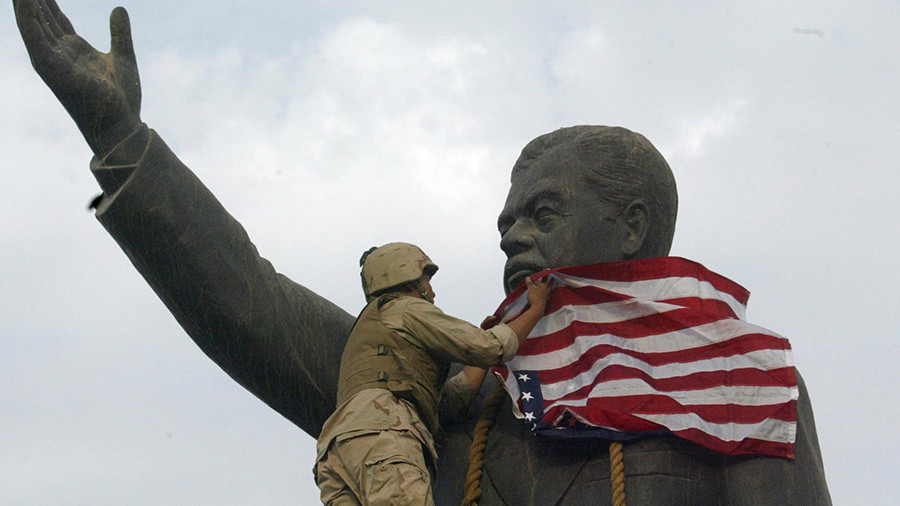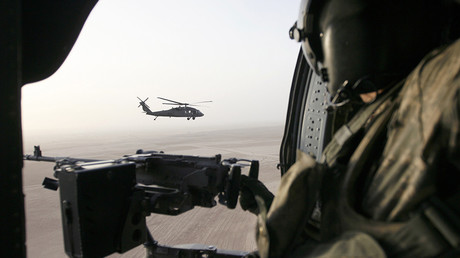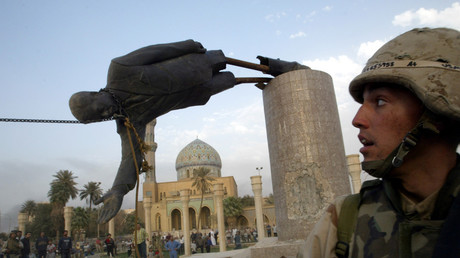Lessons from Iraq remain unlearned – ex-Pentagon official recalls WMD fiasco

Recent actions by the United States in the Middle East suggest it hasn’t learned anything from its monumental debacle 15 years ago by invading Iraq, under a preemptive policy of regime change.
The strategy, led by the neocons in the Pentagon, was to throw out then-Iraqi President Saddam Hussein, replace him with a government favorable to the US, and then proceed to regime change in Syria, Iran, and Libya, due to their close ties to Hussein.
Given the pro-Israeli neocons running the Pentagon at the time, such as then-Deputy Secretary Paul Wolfowitz, and his undersecretary of defense, Doug Feith, their strategy had the effect of having the Pentagon become an instrument of carrying out the foreign policy of Israel, which regarded these Middle East countries as a threat to its survival.
Even prior to becoming the deputy secretary of defense, Wolfowitz had designs of taking out Hussein.
He sought to develop a basis for invasion, based initially on Iraq’s support for terrorism and later possession of weapons of mass destruction, or WMD.
There was a time constraint – the United Nations was about to lift years of sanctions that had been imposed on Iraq following Desert Shield/Desert Storm, actions the US and its allies took to kick Iraq out of Kuwait.
In the spirit of transparency, I was director of Technology Security Operations in the Office of the Secretary of Defense during this period. Despite having WMD inspectors in and out of Iraq for a decade, however, my office at the time, which monitored technology to Iraqi research and development facilities over the years, had determined that there was no evidence of operational WMD left in Iraq.
However, that didn’t stop the Central Intelligence Agency, then led by George Tenet, to publish in October 2002 a National Intelligence Estimate that Iraq indeed had WMD. Then in December 2002, Tenet briefed President George Bush, saying that the evidence was a “slam dunk.”
The CIA’s own determination is interesting, since there has been a mantra for years that the Pentagon cherry-picked intelligence to come up with the Iraqi WMD scenario. It was Tenet who sat directly behind then-Secretary of State Colin Powell at the United Nations when he sought to make the case for Hussein’s removal. The spotty information was gleaned from intercepts which Tenet’s analysts pieced together but was, at best, incomplete and often misleading.
Even though the US went ahead with its invasion in March 2003, it didn’t need to happen.
Three months prior to the US invasion of Iraq, the Syrians had approached a Lebanese-American in Beirut, Dr. Imad Hage, who was a friend of mine, seeking to open a back channel with Pentagon policymakers in the Office of the Secretary of Defense where I worked. At the time, I was reporting directly to Feith and to a special assistant to Wolfowitz.
Prior to the invasion, Hage had told US and local media in Beirut , as well US officials, that there would be a devastating effect of a war which would have a serious adverse impact on the Iraqi people generally, but particularly on the various minorities that make up the population of Iraq.
He said that the US could defeat Hussein in a month but that would not bring peace and stability to Iraq “for decades.”
He told me that a war “would transform Iraq into a bloody Greek theatre,” referring to the violence and revenge that would ensue among the myriad of minorities in the country. He also said that Iraq, which didn’t have any terrorist groups at the time, “eventually would become a haven for jihadists.”
Hage then sent a message from Hussein. The deal would include six concessions in exchange for the US not attacking Iraq. The Syrians were concerned that if such an invasion occurred, it would have a spill-over effect on their own country.
Of the six terms, two of them could have been tested immediately to determine Iraq’s seriousness. One was to turn over to US authorities the Iraqi-American terrorist living in Baghdad, Abdul Rahman Yassin, who was involved in the first bombing of the World Trade Center in 1993. To this day, Yassin remains at large, with a $5million reward offered for his capture.
Another term was even more intriguing. Saddam Hussein would allow 5,000 US troops to enter into Iraq to look for WMD. In effect, the US could have walked into Iraq without firing a shot.
The Syrians even offered to stage US troops to enter Iraq. In exchange, the Damascus government requested US assistance in economic infrastructure development.
Hussein also offered the US majority ownership of all Iraqi oil, and elections under United Nations auspices. At the same time, he would seek asylum in another country, most probably Saudi Arabia. Ironically, it was Wolfowitz who commented that the sale of Iraqi oil would pay for the US invasion. That never happened.
Nevertheless, Pentagon policymakers turned down all of Hussein’s unconditional terms. Why?
The decision of regime change in Iraq had been made, no matter what. The military solution was inevitable, since an earlier attempt to train Iraqis to undertake the effort had fizzled.
In seeking a back channel, the Syrians said there was information that would be shared with the United States that it would not admit to publicly. As an initial test of that channel, the Syrians were asked whether Iraqi WMD had been sent to Syria prior to US action.
The response, from no less than one of Syrian President Bashar Assad’s top advisers, Mohammed Nassif, to the Lebanese-American intermediary and then relayed to me, was that publicly Syria would deny their existence in Syria. However, if the back channel were created, “There would be a lot we could talk about.”
However, the Bush administration never followed up on the offer. Instead, then-Secretary of State Colin Powell in May 2003 visited Syria and publicly confronted and warned Mr. Assad Mr. Powell accused Syria of harboring Saddam Hussein’s escaped leadership and Iraq’s WMD.
Unfortunately, US policymakers in the days leading up to US action in Iraq and afterward left to the Central Intelligence Agency any initiatives to Syria. The CIA jealously coveted its own exclusive back channel to Syria. So the CIA made every effort to scuttle the Syrian opening of a back channel to US policymakers in the Pentagon.
This became apparent when the CIA rejected a Syrian initiative months earlier of similar unconditional terms prior to US action in Iraq. Once rejected, the CIA then subverted the eleventh-hour Syrian initiative to present the same terms to Pentagon policymakers through my office.
The CIA was so upset with this attempt that it even accused me in particular of attempting to run a “rogue” operation to bypass the agency. That wasn’t true, since the CIA was informed of all steps. Informing the CIA, however, helped CIA elements more interested in damaging the Bush administration to scuttle that attempt.
In effect, the CIA had set up the Bush administration for failure. Syrians interested in working closer with the US saw for themselves the CIA’s scuttling efforts.
In turn, Syria decided to close its own channel with the CIA. In October 2003, Tenet went to Syria to try to patch up the CIA-Syrian channel. He did not succeed.
The ensuing eight years of war in Iraq has cost trillions of dollars, the loss of life of some 4,500 US troops and the tens of thousands of service personnel seriously maimed for life, and the death of hundreds of thousands of Iraqis. The US has nothing to show for it, while its influence in the entire region has plummeted to next to nothing.
Yet, the US was instrumental in the overthrow of Muammar Gaddafi, has aided jihadi Salafists in attempting to overthrow the Syrian government of Bashar Assad, and is about ready to embark on other regime change initiatives in the Middle East and elsewhere. Will the US ever learn?
F. Michael Maloof for RT
Michael Maloof is a ormer Pentagon official and security analyst
The statements, views and opinions expressed in this column are solely those of the author and do not necessarily represent those of RT.





0 Comments:
Post a Comment
Subscribe to Post Comments [Atom]
<< Home